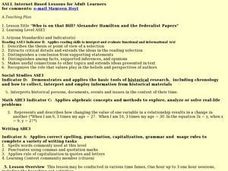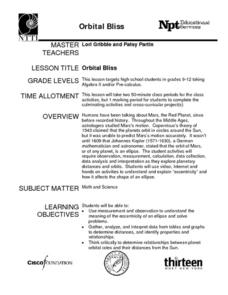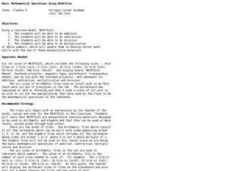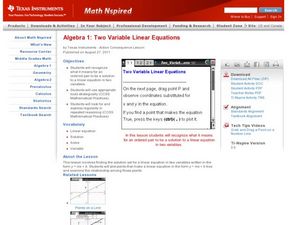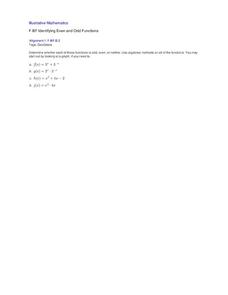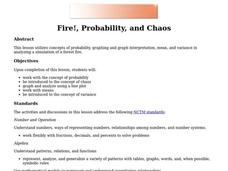Curated OER
Class of Gold
How can you see a number in nature? Here, learners discover both Fibonacci numbers and the golden ratio by exploring a number of different resources. Note: Some of the resources are older and may be missing some of the links, but...
Curated OER
One Variable Word Problems
Here is a one-variable word problems worksheet in which learners complete word problems dealing with all four operations and one variable. They complete a total of 18 problems.
Curated OER
Vertex Form of Parabolas
Using the method of completing the square, algebra learners rewrite quadratic equations from standard form to vertex form. They will also graph quadratics, stating the vertex and axis of symmetry. Solutions are provided.
Illustrative Mathematics
Watch out for Parentheses
It is important for the algebra learner to understand the use of parentheses. Mathematicians of all levels can make errors with nested parentheses. This will give them some practice. It makes for a good class starter or quick assessment.
Curated OER
Who is on that Bill? Alexander Hamilton and the Federalist Papers
Students, who are adult learners, participate in an Internet scavenger hunt in order to assimilate information about the biography of Alexander Hamilton and the Federalist Papers. They look at the Federalist and Anti-Federalist Papers...
Curated OER
Orbital Bliss
Most young mathematicians are aware that the planets don’t orbit the sun in a circle but rather as an ellipse, but have never studied this interesting feature. This resource looks at the planetary orbits in more detail and helps learners...
Utah Education Network (UEN)
Pattern Search
Pupils identify and define various mathematical properties, such as the commutative properties of addition and multiplication, and the associative property of addition. They also reason and communicate mathematically by making...
Curated OER
Basic Mathematical Operations Using Math Tiles
Practice addition, subtraction, multiplication, and division using tiles as manipulatives. In this math operations lesson, young learners choose the appropriate sized tiles, arrange them according to directions given by the teacher, and...
Utah Education Network (UEN)
The Distributive Property For Numerical and Variable Expressions
Collaborate to research and share. Doesn't that sound great? Learners explore algebraic expressions, use Algeblocks to examine and compare numerical and variable expressions, and apply the distributive property. Examples and worksheets...
Curated OER
Linear Equations
This is a great lesson from start to finish. With partners and on their own, learners write and solve linear equations and inequalities. They use manipulatives, group work, and an included worksheet to make magic with their problem...
Curated OER
Translate Word Phrases and Sentences into Equations
Use this video to show your learners an example of how to translate word phrases into an equation to solve a real-world problem. The presenter begins with a review of how to use cross products to solve a proportion, including how to do...
Curated OER
Reflections
Learners explore reflection of polygons on a coordinate plane. They examine the relationships that exist between corresponding points and sides.
Curated OER
Two Variable Linear Equations
Everything you need to teach a lesson on two variable linear equations is right here. Objective, vocabulary, tech tips videos, and multiple downloadable files are all included. Learners will use the TI-Nspire technology to determine the...
Illustrative Mathematics
Identifying Even and Odd Functions
Use a worksheet to give learners practice in identifying even and odd functions. The problems on this page are also appropriate for use as assessment items, or you can use them with GeoGebra to interactively present concepts. The task is...
Illustrative Mathematics
Firefighter Allocation
Creating equations with one variable to solve real-world-type problems is a key skill any algebra learner needs to master. Here the focus is on realizing that one can write the equation in different ways depending upon how one...
Shodor Education Foundation
Surface Area of Rectangular Prism
With this interactive lesson, learners compute the surface area of rectangular prisms. They visit an online investigation applet and record data on the provided handout. Pair this lesson with the volume lesson by the same publisher as an...
Curated OER
Volume of Rectangular Prisms
Introduce the procedure needed to find the volume of a rectangular prism. Learners rank various prisms such as cereal boxes and tissue boxes from smallest to largest volume. They use an applet to find the volume and surface area of each...
Curated OER
Graphs and Data
Students investigate poverty using graphs. In this algebra lesson, students collect data on the effects of poverty and use different rules to analyze the data. They graph and use the trapezoid rule to interpret the data.
National Security Agency
Sampling for a Rock Concert
Over the course of three class periods, middle schoolers design an experiment to provide learner input to administration about which rock band to invite to play at school. They practice several random sampling exercises, all well...
Curated OER
Patterns Everywhere!
Learners recognize and demonstrate the patterning of numbers and objects in our environment. They create a pattern using geometric shapes and find a missing number in a sequence.
Curated OER
How Simple Is Your Rational Expression?
Investigate simplifying rational expressions. Learners define rational expressions, review how numerators and denominators are polynomials and complete several problems using a checklist to ensure they don't skip any steps. Work can be...
Curated OER
The Pythagorean Theorem Lesson 2
Learners discuss and review examples of the Pythagorean Theorem using a GSP, Geometer's Sketchpad, activity.
Curated OER
Scatter Plot Basketball
Learners take turns shooting baskets and creating scatterplots based on the data. They create two graphs and look for possible correlation in the data for each graph.
Curated OER
Fire!, Probability, and Chaos
Upper elementary and middle schoolers work with the concept of probability. They are introduced to the concept of chaos. Learners graph and analyze using a line plot, work with mean, and are introduced to the concept of variance.




